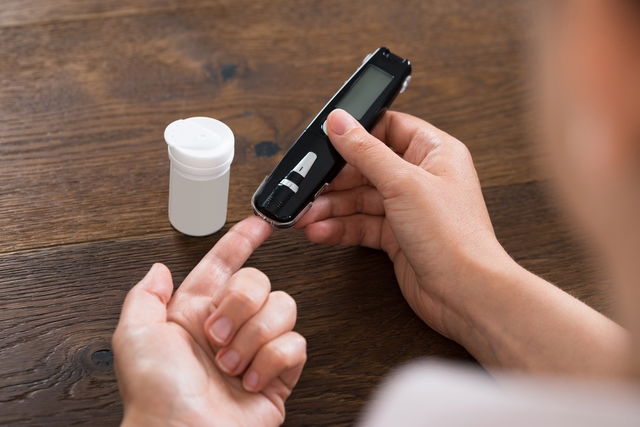Hypoglycemia occurs when blood sugar levels are too low. The normal value for a fasting blood sugar is between 70-99 mg/dL (4-6 mmol/L). Hypoglycemia is defined as blood sugar levels less than 70 mg/dL (4 mmol/L).
Hypoglycemia, or low blood sugar, can cause symptoms such as dizziness, shaking, cold sweats, tiredness, confusion, palpitations, and even fainting.
The treatment for hypoglycemia is to consume 15 g of simple carbohydrates, such as 4 glucose tablets, 4 oz (1/2 a cup) of orange juice, or one tablespoon of honey. Blood sugar is then rechecked after 15 minutes. Severe hypoglycemia requires an injection of glucagon and emergency medical attention.

Common symptoms
The main symptoms of hypoglycemia are:
- Shaking;
- Dizziness;
- Tiredness;
- Cold sweats;
- Headache;
- Irritability and confusion;
- Fainting;
- Palpitations (fast heartbeat).
Symptoms of hypoglycemia typically come on rapidly once the blood sugar falls below 70 mg/dl (4 mmol/L).
Some people can tolerate lower blood sugar levels than others, whereas other people may develop symptoms even before the blood sugar drops below 70 mg/dL (4 mmol/L).
Making the diagnosis
A doctor or other healthcare professional can diagnose hypoglycemia based on presenting symptoms as well as a person's medical and family history.
To confirm a diagnosis, your healthcare provider will order a blood test to check the levels of glucose (sugar), insulin, proinsulin, and C-peptide in your blood.
People with diabetes need to check their blood sugar daily using a home glucometer, which is a machine that takes a rapid measurement of your capillary blood glucose and gives you the result right away on the screen. Glucometers can be found and purchased at most pharmacies and may or may not be covered by insurance.
Possible causes
Hypoglycemia can occur from the use of insulin or oral medications used to treat diabetes, which can cause levels of glucose in the blood to drop too low.
Hypoglycemia can also happen from eating too few carbohydrates or drinking too much alcohol. It may also occur following surgery or after a prolonged period of fasting. Other causes of hypoglycemia include hormone deficiencies and excessive physical exercise, as well as liver, kidney, and heart disease.
Also recommended: Diabetes Medications: Insulin, Oral Meds & Natural Options tuasaude.com/en/diabetes-medicationsTreatment guidelines
Treatment of hypoglycemia will vary depending on severity. If the person is conscious, it is important to immediately consume food or drinks high in simple sugars in order to more rapidly increase blood sugar.
The fundamental steps for managing an episode of hypoglycemia are:
- Consume 15 g of fast-acting carbohydrates, such as 4 oz (1/2 cup) of fruit juice (orange, apple, or grape juice, for example), 1/2 a can of regular soda (not diet), or 1 tablespoon of honey;
- Check your blood sugar again after 15 minutes, and if it is still less than 70 mg/dL (4 mmol/L), eat another 15 g of simple carbohydrates. Repeat until blood sugar has normalized (greater than 70 mg/dL or 4 mmol/L);
- Make a snack high in carbohydrates, once blood sugar levels are in the normal range. Some options include bread, toast, or crackers;
- Avoid foods high in fiber, like beans, chickpeas, and lentils, as well as foods with a lot of fat, like chocolate, as these can slow down the absorption of sugar in the body.
In cases of severe hypoglycemia, when blood sugar levels are low and the patient presents with symptoms such as lethargy, slurred speech, or loss of consciousness, an injection of glucagon should be given, if available. After administering the glucagon, wait 20 minutes and recheck the blood sugar. If it is still low, call 911 or the local emergency number. It is also important to call 911 immediately if you find someone who is unconscious.
Because children typically need less than 15 g of simple carbohydrates to treat hypoglycemia, it is recommended to consult your pediatrician to confirm the amount of carbohydrates needed based on the age of the child.
Preventing hypoglycemia
Some tips to avoid episodes of hypoglycemia, especially in people with diabetes, include:
- Taking the correct dose of medications;
- Working with a dietitian to develop a meal plan that includes the ideal amounts of carbohydrates;
- Avoid skipping meals;
- Do not drink alcohol;
- Engage in regular, moderate levels of physical exercise;
- Check your blood sugar before being physically active;
- Check your blood sugar before and after meals.
If you have been cleared to drink alcohol by your healthcare provider, it is important to follow some guidelines to avoid hypoglycemia, such as drinking slowing and not drinking on an empty stomach.
In addition, it is recommended to always have a source of rapid-acting carbohydrates with you, like a juice box or glucose tablets, in case of an episode of low blood sugar.






























